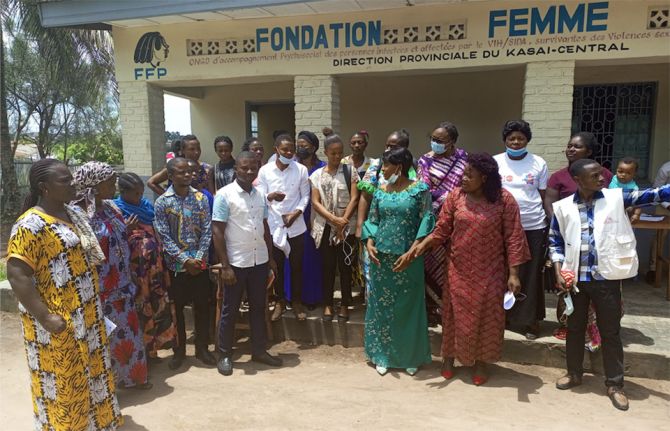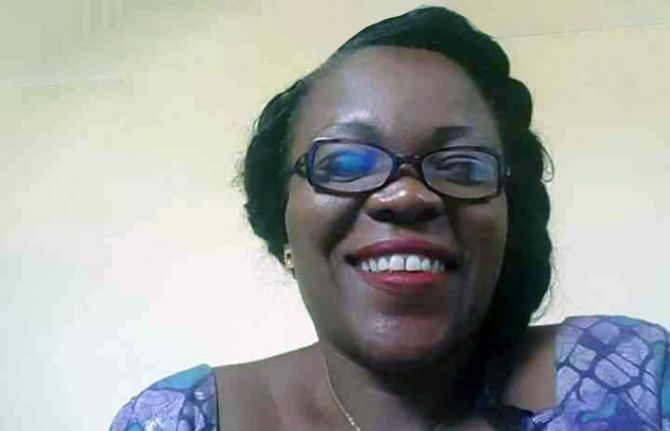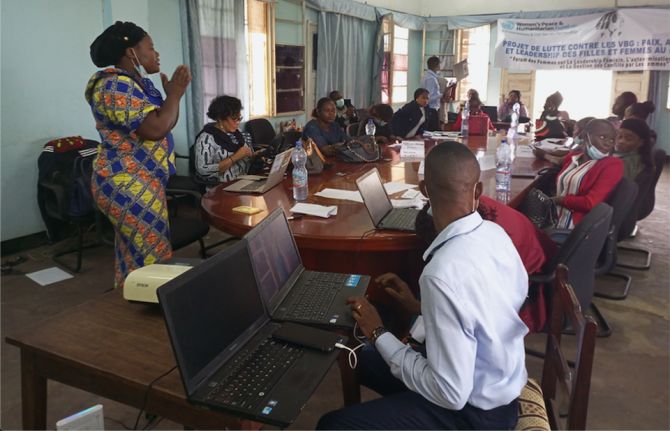



Feature Story
In the Democratic Republic of Congo, Thérèse Omari maintains her commitment to ending AIDS and providing a fulfilling and harmonious life for people living with HIV
28 July 2022
28 July 2022 28 July 2022"We are here, we are not giving up". These are the encouraging words of Thérèse Omari, an activist who has been involved in the fight against AIDS for more than 20 years within the Femme Plus organisation, of which she is the co-founder and National Director in the Democratic Republic of Congo.
Femme Plus, true to its motto "Positive Life", works to improve the quality of life of people living with HIV. "The objective is for our beneficiaries to live in harmony with themselves, with their environment and with their beliefs," explains Ms Omari.
To this end, the organisation provides psychosocial support to people living with or affected by HIV through counselling, care and support services. Femme Plus also carries out numerous activities in communities to free people living with HIV from the burden of stigma. "There is still a lot to be done to change behaviours towards people living with HIV," says Ms Omari. In the Democratic Republic of Congo, HIV-related stigma is still very present, especially in community settings. "Many people living with HIV say they no longer participate in family gatherings and other events fearing discrimination. It is therefore essential that people who come to Femme Plus feel that they are considered normal people with rights and obligations," she explains. In order to raise awareness, the organisation runs workshops to provide communities with the knowledge to better support people living with HIV, without isolating them or treating them differently.
Ms Omari also deplores the persistence of stigma and discrimination in health care settings despite the numerous HIV-related trainings for health care workers. In particular, she receives testimonies from pregnant women who have tested positive for HIV in one facility and wish to give birth in another, fearing of being stigmatised and treated differently. This is problematic as it can be detrimental to the provision of appropriate care for the mother and baby.
Ending discrimination and ensuring that the rights of people living with HIV are protected is therefore one of Femmes Plus' priorities to help them assert themselves and make the right choices about their health. "We encourage people living with HIV to empower themselves, to speak up about their condition, for their own well-being," says Ms Omari.
Ms Omari also raises other obstacles to the AIDS response. The lack of access to prevention and treatment, and the low rate of people with an undetectable viral load, are among the shortcomings of the fight against HIV in the Democratic Republic of Congo. "Not everyone has access to testing. There are still people with HIV who live in anonymity," warns Ms Omari.
To overcome this gap, Femme Plus works with community leaders to teach them how to stay healthy with HIV. Among other activities, it also engages with pregnant and breastfeeding women, providing them with the knowledge to protect their babies and thereby stop vertical transmission.
"As long as there are people who do not know their HIV status, who do not have access to treatment and who have not reached an undetectable viral load, the fight of Femme Plus will remain meaningful," insists Ms Omari.
She concludes by pointing out that the fight against AIDS in the Democratic Republic of Congo is taking place in a context where resources are limited. "The local population must be involved in psychosocial care and prevention activities to make HIV an electoral issue," she explains. While waiting for more substantial funding from the State and better traceability of funds, community-led services have a crucial role to play with people living with HIV. They are at the heart of the fight against AIDS, advocating for access to prevention and life-saving care, calling for respect for human rights and addressing the specific needs of their beneficiaries. Their support is therefore pivotal in meeting the challenges of the HIV response and ending AIDS by 2030.



